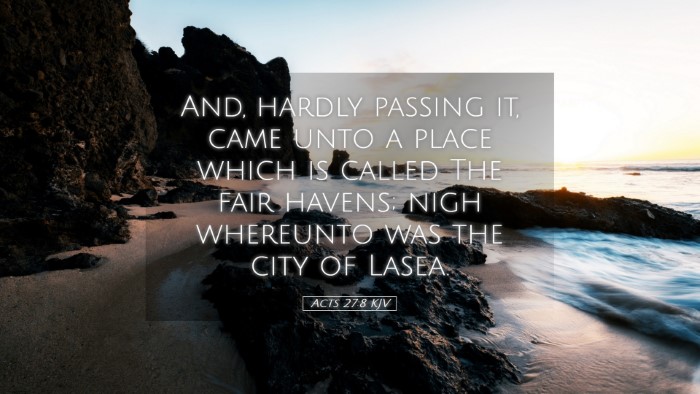Commentary on Acts 27:8
Acts 27:8 states: "And, with difficulty, sailing past it, we came unto a place which is called The Fair Havens; near whereunto was the city of Lasea."
Introduction
This passage occurs during Paul's journey to Rome. It highlights the challenges faced by Paul and his companions while navigating treacherous waters. In exploring this verse, we draw insights from several notable public domain commentaries, offering a rich understanding of the text’s implications for believers and the significance of their maritime journey.
Historical Context
In examining the historical context, it is essential to recall that Paul was a prisoner en route to Rome following his appeal to Caesar. The journey was fraught with peril, as maritime travel in ancient times was often dangerous.
Narrative Flow
The mention of "The Fair Havens" indicates a moment of respite in an otherwise tumultuous journey. Here, we will explore insights from Matthew Henry, Albert Barnes, and Adam Clarke.
Insights from Public Domain Commentaries
Matthew Henry’s Commentary
Matthew Henry emphasizes the hazardous nature of the journey and the significance of the location they reached, The Fair Havens. He remarks on the difficulty of the voyage, alluding to how challenging circumstances can lead to places of refuge and peace.
- Refuge in Adversity: Henry posits that The Fair Havens is symbolic of God’s provision even amidst challenges. This sentiment encourages believers to recognize God’s hand during difficult times.
- Human Struggle: He elaborates on the hardships that sailors faced. The journey serves as a metaphor for the struggles of life and the need for divine guidance.
Albert Barnes’ Notes
Albert Barnes provides a detailed explanation of the geographical and nautical context of the verse. He notes that The Fair Havens was a harbor on the southern coast of Crete suitable for anchoring, which thus held significance for the crew.
- Geographical Significance: Barnes points out that reaching The Fair Havens showed the crew's resilience and resourcefulness, even when conditions were adverse.
- Symbol of Hope: He draws connections between the Fair Havens and the hope found in the midst of trials, encouraging believers to seek safe harbors in their spiritual journeys.
Adam Clarke’s Commentary
Adam Clarke takes a theological approach, examining the verse's implications for understanding God’s providential care. He highlights that every detail of the journey has a significant role in the unfolding of divine plans.
- Divine Guidance: Clarke stresses the importance of listening to God, as it was crucial for Paul to be aware of God's plans amid the tumultuous journey.
- Preparation for Future Trials: He suggests that this part of the journey prepared Paul and his companions for later challenges, reflecting God's sovereignty in guiding them through difficulties.
Theological Implications
Acts 27:8 offers rich theological implications for contemporary believers:
- The Nature of Divine Providence: The passage illustrates God's sovereignty, suggesting that even in perilous times, God is orchestrating events according to His will.
- Endurance in Trials: The struggle to reach The Fair Havens points to the need for perseverance in the face of adversity, encouraging believers to maintain faith during life's storms.
- Community and Support: The collective struggle of Paul and the sailors reflects the importance of community in faith, urging believers to support one another through challenges.
Application for Believers
As pastors, students, theologians, and scholars ponder this passage, the lessons from Acts 27:8 serve to remind us of the following:
- Seeking Refuge in God: Just as The Fair Havens served as a refuge, believers can find solace in God during the storms of life.
- Courage to Navigate Life’s Journey: The verse underscores the need for courage and determination to endure hardship while trusting in God's guidance.
- Value of Wisdom and Leadership: The presence of Paul, a divinely chosen leader, exemplifies the role of spiritual leaders in guiding communities during tumultuous times.
Conclusion
Acts 27:8 encapsulates a critical moment in a broader narrative of faith, resilience, and divine providence. By synthesizing insights from acknowledged commentators, this exploration provides a meaningful perspective for engaging with the text on both scholarly and pastoral levels. Believers are called to navigate their life's journey with the understanding that, despite trials, they can trust in God's sovereign plan.


